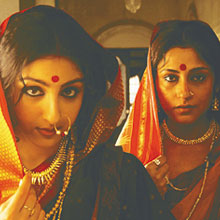 Indian society. A film can either be viewed as a simple story well narrated or as a larger message hidden within the story. Two flicks that I recently saw had, surprisingly, juxtapositioned how Indian society viewed its women. ‘Antarmahal’ – a view of the Inner Chamber or, to me, an intimate view of the sanctum sanatorium of marriage. This period portrays the twin lives of the wives of a zamindar’s harem. Directed by Rituporno Ghosh, this perhaps is among the best Bengali movies that he has directed. The second film – ‘Water’ – directed by Deepa Mehta is also a period film depicting the life of widows in India.
Indian society. A film can either be viewed as a simple story well narrated or as a larger message hidden within the story. Two flicks that I recently saw had, surprisingly, juxtapositioned how Indian society viewed its women. ‘Antarmahal’ – a view of the Inner Chamber or, to me, an intimate view of the sanctum sanatorium of marriage. This period portrays the twin lives of the wives of a zamindar’s harem. Directed by Rituporno Ghosh, this perhaps is among the best Bengali movies that he has directed. The second film – ‘Water’ – directed by Deepa Mehta is also a period film depicting the life of widows in India.
 Both the directors wouldn’t have met over a cup of coffee and discussed their films but it is pure serendipity that I watched these 2 films back to back. Antarmahal shows how a Zamindar remarried again since he failed to beget a child with his first wife and the intertwined lives of his wives. The zamindar, as a typical all powerful male, refuses to believe that he is impotent and not his wives.
Both the directors wouldn’t have met over a cup of coffee and discussed their films but it is pure serendipity that I watched these 2 films back to back. Antarmahal shows how a Zamindar remarried again since he failed to beget a child with his first wife and the intertwined lives of his wives. The zamindar, as a typical all powerful male, refuses to believe that he is impotent and not his wives. The belief, that a male can’t be impotent, peaks to such levels of absurdity that he gets a Brahmin to chant Vedic verses while he makes love to his wife, not once or twice but everyday. It is so easy, in today’s context, to replace the zamindar with a typical Indian male. You would see the same thought process and the same haughtiness. The zamindar also had a concubine, needless to say childless again. When the zamindar’s second wife quizzes him on why does he have a different eau-de-cologne on then what he had in the morning, pat comes the reply “A man from a rich family is expected to have a different eau-de-cologne on when he returns home in the evening!”
The belief, that a male can’t be impotent, peaks to such levels of absurdity that he gets a Brahmin to chant Vedic verses while he makes love to his wife, not once or twice but everyday. It is so easy, in today’s context, to replace the zamindar with a typical Indian male. You would see the same thought process and the same haughtiness. The zamindar also had a concubine, needless to say childless again. When the zamindar’s second wife quizzes him on why does he have a different eau-de-cologne on then what he had in the morning, pat comes the reply “A man from a rich family is expected to have a different eau-de-cologne on when he returns home in the evening!”
‘Water’ exposes the soft underbelly of Indian society exposing its sycophancy in dealing with widows.  Indian widows, as a tradition, are supposed to shave their heads, don a plain cotton white saree, sustain on a strictly vegetarian diet and keep off fried food! Child marriages was rampant (in fact the norm!) right upto the early 19th century and you had child widows who had never met their husbands except the day that they got married. So what does the child bride remember about the marriage? The feast, the guests
Indian widows, as a tradition, are supposed to shave their heads, don a plain cotton white saree, sustain on a strictly vegetarian diet and keep off fried food! Child marriages was rampant (in fact the norm!) right upto the early 19th century and you had child widows who had never met their husbands except the day that they got married. So what does the child bride remember about the marriage? The feast, the guests crowding in, the bright and colorful dress, and all the pampering! One stoke of fate turns a bright, bubbly child into a widow, plucked from her home, her parents and siblings and literally dumped in one of the teeming ‘Ashrams’ meant for widows either in Benaras (Varanasi) or Vrindavan! So what happened in the ashram? The less told the better. The widows were peddled to satisfy the whims and fancies of the landed gentry and high profile Brahmins. And what does one of the Brahmins have to say on this, “A widow is blessed when she makes love to a Brahmin!”
crowding in, the bright and colorful dress, and all the pampering! One stoke of fate turns a bright, bubbly child into a widow, plucked from her home, her parents and siblings and literally dumped in one of the teeming ‘Ashrams’ meant for widows either in Benaras (Varanasi) or Vrindavan! So what happened in the ashram? The less told the better. The widows were peddled to satisfy the whims and fancies of the landed gentry and high profile Brahmins. And what does one of the Brahmins have to say on this, “A widow is blessed when she makes love to a Brahmin!”
So does contemporary India continue to have these practices? Yes and No. India lives in multiple worlds and periods. The rural areas still practice child marriages. City dwellers are more enlightened though the strictures for a widow is still followed, excepting the shaving of the head. Do the men follow the same rules when they are bereaved from their wives? NO.
 That also brings us to the title of this post. Manu, a revered sage of ancient India, was and is regarded as a lawgiver par excellence of both ancient and modern India. While he would have framed his laws in keeping with the times and social environment when he was alive, his laws were twisted and interpreted to suit males, Brahmins, the Kashtriyas…. in that order. Some gems from Manu to illustrate what I mean.
That also brings us to the title of this post. Manu, a revered sage of ancient India, was and is regarded as a lawgiver par excellence of both ancient and modern India. While he would have framed his laws in keeping with the times and social environment when he was alive, his laws were twisted and interpreted to suit males, Brahmins, the Kashtriyas…. in that order. Some gems from Manu to illustrate what I mean.
By a girl, by a young woman, or even by an aged one, nothing must be done independently, even in her own house. [v.5.147.]
In childhood a female must be subject to her father, in youth to her husband, when her lord is dead to her sons; a woman must never be independent. [v.5.148.]
Though destitute of virtue, or seeking pleasure (elsewhere), or devoid of good qualities, (yet) a husband must be constantly worshipped as a god by a faithful wife. [v.5.154.]
A man who is not a Brahmana ought to suffer death for adultery (samgrahana); for the wives of all the four castes even must always be carefully guarded. [v.8.359.]
Let him never slay a Brahmana, though he have committed all (possible) crimes; let him banish such an (offender), leaving all his property (to him) and (his body) unhurt. [v.8.380.]

No comments:
Post a Comment